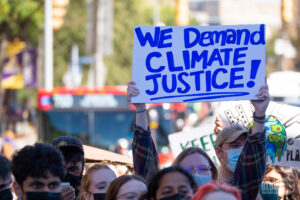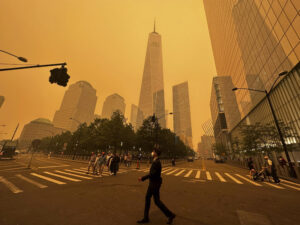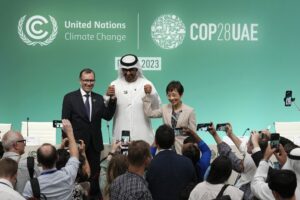Palauan President Urges Global Moratorium on Deep-Sea Mining
Surangel Whipps Jr., president of the island nation, spoke at the U.N. General Assembly about the potentially devastating consequences of deep-sea mining. Palau President Surangel Whipps Jr. addresses the 78th session of the United Nations General Assembly, Tuesday, Sept. 19, 2023, at U.N. headquarters. (Photo: AP Photo/Frank Franklin II)
This is Part of the "The Scramble for Deep-Sea Minerals" Dig series
Palau President Surangel Whipps Jr. addresses the 78th session of the United Nations General Assembly, Tuesday, Sept. 19, 2023, at U.N. headquarters. (Photo: AP Photo/Frank Franklin II)
This is Part of the "The Scramble for Deep-Sea Minerals" Dig series
At a recent meeting of the U.N. General Assembly, Surangel Whipps Jr., president of the Republic of Palau, expressed his government’s support for a proposed moratorium on deep-sea mining.
He and leaders of other nations have echoed the worldwide call for a pause on mining until humans know more about the potential consequences of disturbing the deep sea.
Deep-sea minerals are being marketed as a panacea to global warming because they’re being used in electric vehicles and other systems reliant on renewable energy. The minerals are lying on or locked in the seabed, which stores carbon that cycles out of the atmosphere.
Most of them are located in the Pacific Ocean, which is inhabited by large ocean states with small landmasses that face pronounced economic challenges, including the high cost of transportation, the outmigration of educated workers and dependence on tourism and other external forces.
In his address at the U.N., Whipps explained that to diversify its economy, Palau’s government is “looking to the digital world, which doesn’t rely on land mass, but on our determination to succeed.” This pivot, he explained, is “born out of a harsh lesson” initiated in 2016, when the country’s tourism-dependent economy contracted, and amplified in 2020 when the coronavirus prompted the closure of Palau’s borders. COVID-19, Whipps said, “could have very well knocked us out” were it not for the support of organizations offering aid.
He described the extent of the threat climate change poses to small islands:
In my youth, I’d spear fish on the reef with my father, helping to provide for our family. There was one remote island in Palau’s southern waters, where we would go it was alive with birds, turtles and fish and clams. Recently, I revisited this island with my children [to witness] turtles laying their eggs. The island had diminished in size by two-thirds due to sea level rise, and sadly half the turtles eggs that were laid that night, were in the tidal zone and unlikely to survive. This heart-wrenching reality mirrors the fate of our homes and cultures if we fail to take decisive action. We urgently call on the G-20 nations responsible for 80% of global carbon emissions to uphold their commitments to the Paris Agreement and limit warming to 1.5 degrees. This is crucial to mitigate the climate change impacts like disappearing islands and unhatched turtle eggs.
Whipps applauded the ambitious policies passed at international climate change conferences, including COP26 and COP27, and, in contrast to the narrative that deep-sea minerals will fix our ailing world, applauded the proposed moratorium on mining them. “Proponents argue seabed minerals aid [the] renewable transition,” he said. “But the reality is we lack the knowledge about the potential impacts on the underwater ecosystems this devastating action could have, disturbing the ocean bed we know could release stored carbon dioxide, which directly contradicts with our efforts to combat climate change.”
Whipps concluded his address with a story about a young Palauan who went to the forest to cut down a tree to be carved into a canoe. The log ended up in a taro swamp and, unable to move it, the young boy returned home. His father gave him a chant. The boy returned to the taro swamp with the chant and his friends, who helped him pull the log from the sludge. The story, Whipps explained, is about unity, and only by uniting will we move towards “a sustainable future where our grandchildren can breathe clean air, swim in pristine seas, live in peace and prosper,” he said.
Your support matters…Independent journalism is under threat and overshadowed by heavily funded mainstream media.
You can help level the playing field. Become a member.
Your tax-deductible contribution keeps us digging beneath the headlines to give you thought-provoking, investigative reporting and analysis that unearths what's really happening- without compromise.
Give today to support our courageous, independent journalists.






You need to be a supporter to comment.
There are currently no responses to this article.
Be the first to respond.